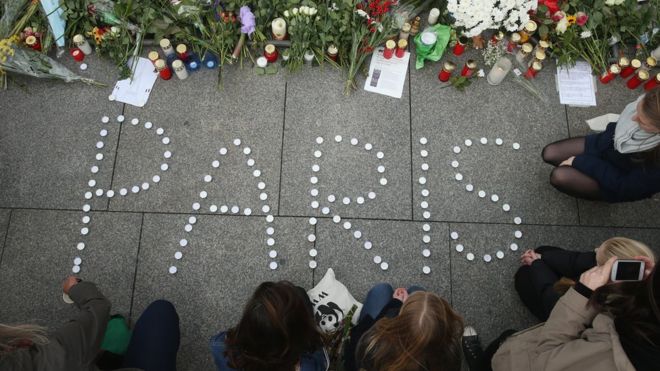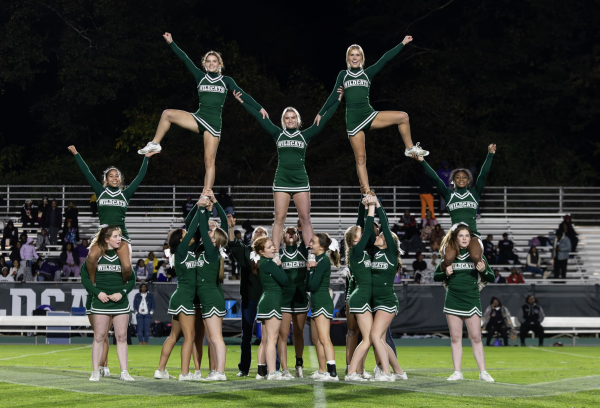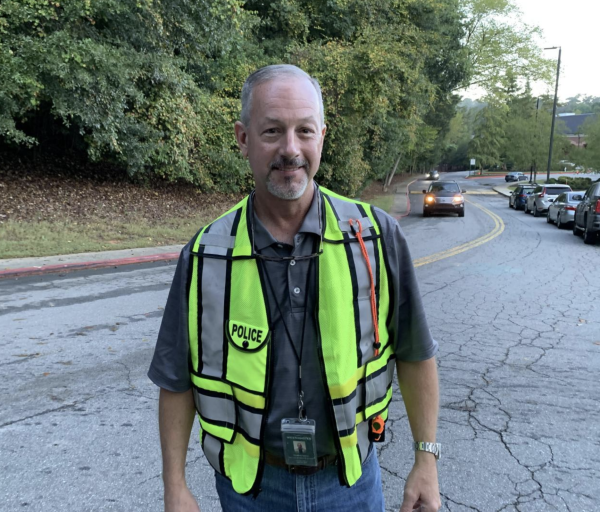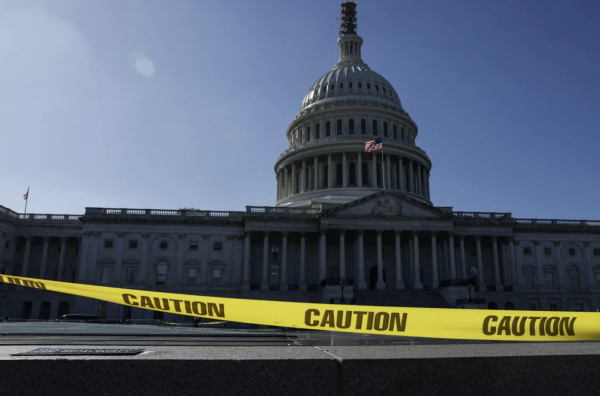Paris terror attacks spark unrest, raise political questions
After claiming responsibility for a series of shootings and bombings in Paris on Friday, Nov. 13, ISIS called the attacks “the first of the storm.” In the wake of the tragedy that took the lives of 130 civilians and wounded 350 more, a sharp sense of unease and distrust lingers throughout Europe and the United States. Many fear some inevitable time of reckoning.
“[The attacks were] surreal because it was happening, but at the same time, you were cut off from it all,” said junior Jolisa Brown, a School Year Abroad student who was less than a mile away from the shootings on Nov. 13. “You’re seeing it on the television but it’s not that far away, [and] you don’t realize all the implications of [the attacks] in the moment.”
The BBC notes that between 9:20 and 9:40 p.m., gunmen and suicide bombers from the Islamic State of Iraq and Syria (ISIS) initiated all six attacks. The first was located outside the Stade de France during a France vs. Germany soccer game attended by French president Francois Hollande. Three suicide bombers were prevented from entering the stadium by security guards who detected their explosives. The bombers blew themselves up outside the stadium. If they had been granted entry, they would have caused even more extensive damage.
Less than 10 minutes later, 15 were shot dead with semi-automatic gunfire at Le Petit Cambodge restaurant and Le Carillon bar. Shortly after, there was another shooting on Rue de la Fontaine au Roi that killed five, and yet another at La Belle Équipe bar, killing 19 more civilians. An explosion on Boulevard Voltaire ensued.
Perhaps the horrifying climax of the series of attacks pointed to the situation in the Bataclan concert hall, where the band Eagles of Death Metal was performing a sold-out show. The band’s drummer, Julian Dorio, graduated from Westminster in 2000. Although the band escaped safely, 89 people were shot dead with automatic gunfire, and almost 100 were critically wounded. The gunfire came from three or four attackers, all wearing suicide vests, who entered the concert hall during the concert, blindly opening fire on the audience as well as taking hostages.
One of the attackers was said to have shouted “God is great” in Arabic. One witness heard a gunman blaming President Hollande for intervening in Syria. It was the first clear evidence that Paris was once again being targeted by Islamists, according to the BBC.
Others escaped through an emergency exit and the roof by the time police entered the stadium at 12:20 a.m. and ended the siege.
The BBC noted that Paris was likely chosen for the attacks for a number of reasons, including the accessibility of Europe from the Middle East, the large Muslim population in France, and the strong French opposition to ISIS. At least nine people were directly involved with the attacks, and two are still missing. The overwhelming majority of the attackers had an extensive criminal history, and four were known international terror suspects. Aside from the French nationals, two were brothers from Brussels, Belgium. One terrorist possessed an illegitimate Syrian passport and entered Europe through the Greek island of Leros, likely posing as a Syrian refugee.
“Everyone knows about [the Paris attacks], and it’s something that should be encouraged to be discussed,” said senior and French National Honor Society president Sara Sklenka. “It’s a very difficult subject to tackle head-on.”
Almost immediately, people all over the world began to show that they stood in solidarity with France, from Facebook users adding pictures of translucent French flags to profile pictures to President Obama describing the attacks as attacks on all of humanity.
National monuments such as the White House were lit up in red, white, and blue, the colors of the French flag, and several countries held moments of silence to honor those killed. On Nov. 27, two weeks after the attacks, France held a memorial service attended by around 1000.
“Everyone was so shocked and scared, scared together,” said Sklenka. “[The attacks] brought people together in a really, really horrible way.”
cedented magnitude carry a more complex consequence than a statistic of the number of civilians murdered. Countries, as well as world leaders, are strongly united against terrorism, but strategies to combat it vary just as strongly. Hollande closed French borders for the night and has approved an extended state of emergency in France that will last through February, the first since November 2005. About 1500 soldiers have been deployed to Paris, and the state of emergency will facilitate various government, police and military actions and increase the power of the president in an attempt to pursue the terror threat more effectively. Strict security checks have also been installed and implemented in train stations, shopping centers, and concert halls. Above all, Hollande has declared war on ISIS, but France cannot undertake the fight alone.
The Group of Twenty (G20), composed of 20 countries with the world’s largest economies, met in Turkey the following week to discuss policies to prevent future attacks as well as the broader, but just as critical, subject of containing and fighting terrorism.
Many policies and issues are being called into question, such as the Syrian refugee crisis, the Schengen Agreement, travel concerns, and methods of fighting back.
Because of the civil war in Syria between rebels and President Bashar al-Assad, over four million refugees have fled the country for Europe. It is not difficult to leave the country, nor is it difficult to traverse Europe once entered. The Schengen Agreement, effective since 1995, allows anyone to travel freely between the 26 countries involved. Essentially, the Schengen Area is borderless. In the context of terrorism, the agreement may be called into question. Because one attacker carried a fradulent Syrian passport, the fear of ISIS members posing as Syrian refugees has intensified.
Should countries in Europe continue to welcome refugees? The question has received mixed responses. For example, the Hungarian government strongly opposes refugee resettlement, but German Chancellor Angela Merkel is determined to continue welcoming fleeing refugees.
Another safety-related question arises with Obama’s plan to resettle around 15,000 Syrian refugees within the next year and increase that number dramatically in future years. Could ISIS use the relocation as an opportunity to infiltrate the United States and execute more massive terror attacks? As of Nov. 20, the Republican-led House passed a bill that would restrict the entry of Syrian refugees. Political parties in the U.S. are engaged in heavy debates.
“I think America is a country of immigrants, and it’s important that we allow people who want to come here and work, contribute to our country, and make a life for themselves to do that, but at the same time we need to find a way to make sure that we don’t have Islamic militants coming in to attack us like what happened in Paris,” said junior and Young Conservatives leader Bradley Jones.
Many opinions differ throughout the school campus.
“I would say [to] continue to welcome refugees and immigrants,” said senior Eliza Namnoum. “If not, I feel that…more people being exposed to the anti-Western sentiment in general – pushing people away and refusing to accept people on the basis of fears and prejudices – is exactly what ISIS wants from us…to harm the many based on the acts of the few…we should avoid that at all costs.”
The terrorist attacks also probe some underground questions, such as the degree that the U.S. should aid refugees seeking an escape.
“Europe and America regard the refugees as a political crisis related to ISIS; however, this crisis is far from political,” said senior Sarah Taha, who has lived in Beirut, Lebanon, for most of her life. “It is a humanitarian crisis that everyone should see and start providing aid.”
Another debated strategy involves whether or not countries should send troops to ISIS-controlled territory. The U.S. has also conducted two-thirds of the over 8000 airstrikes in Syria and Iraq. Other countries that have launched airstrikes include France, Canada, Turkey, the United Kingdom (as of Dec. 2), and Belgium. Also according to the Wall Street Journal, although the United States does not currently have troops fighting in the Middle East, it plans the to send additional special forces members to assist Syrian rebels in a “train and equip program” in the fight against ISIS. This would be be the most significant step the United States has taken to combat ISIS in Syria. However, sending more troops to Syria for military purposes is highly questioned.
“People are saying that you need to [refrain from] not [letting] the refugees in or [sending] boots on the ground because that’s exactly what ISIS wants, you [fighting] in their territory,” said junior Arman Varzi, who hosted a French exchange student.
Western countries that may not have had much common ground in the past now have one united goal: to eliminate terrorism. This may bring together nations that have had a conflicted history, like the U.S. and Russia. However, because there are strongly contrasting strategies on addressing the issue of terror, international relations between those countries could also break down. For example, Russia has conducted airstrikes on Syrian rebels and has an interest in keeping President Assad in power, while the United States is trying to assist the rebels.
“I think we’re going to see strengthening of relationships like [the United States and France], but maybe continued erosion of relationships between the U.S. and Russia because they still are trying to work with Assad,” said Namnoum.
The terror attacks not only influenced the political world, but also greatly influenced the socioeconomic world. Because of terrorist threats, companies in the service sector that are affected by tourism such as hotels, restaurants, and other tourist attractions have already declined in activity, although not by much, as noted by The Local. The attacks have caused escalated prejudices toward Muslims, which instills fear in the average tourist.
“It [is] very easy to label everyone that is part of the Islamic faith [as] terrorists or the Syrian refugees [as] all terrorists, but you can’t look at everyone as a whole that way because [there are] good and bad people in each group,” said French teacher Jason Smith. “[That] doesn’t mean the whole group is bad.”
People have stayed away from France because of the fear of terrorism, but this precaution may not be beneficial in the long run.
“People shouldn’t be afraid to travel because that’s what [ISIS] wants. I…am a huge traveler, and I am not letting them scare me into not doing what I love to do,” said Smith. “Keep going, keep exploring, be vigilant, be smart, but don’t let them scare you into not visiting the world.”
Sadly, severe ISIS terror attacks have plagued more than just Paris recently. On Oct. 10, in Ankara, Turkey, 99 were killed and hundreds more were injured in a twin bombing. On Nov. 12, just one day before the Paris attacks, there were another three suicide bombers from ISIS who detonated their suicide vests in Beirut, Lebanon, in a highly condensed Shia neighborhood. One attacker blew himself up outside a Shia mosque. At least 41 were killed and more than 200 were wounded. These bombings were damaging to the fragile stability Lebanon has clung to since the termination of its civil war 25 years ago. But far fewer people know about these bombings than the Paris attacks.
This may be due partly to the fact that bombings are almost commonplace in Lebanon.
“[People] should care about France, but sometimes people just dismiss the fact [that] it …happens in other places, and sometimes it makes me feel angry that no one shows support or help,” said Taha. “In the recent years the bombs happen on the outskirts of Beirut…most of the time the schools open even though there [are] bombs… even in Lebanon itself not a lot of people care anymore because it’s happening so often…that people just kind of get sick of it.”
Regardless of where and when ISIS attacks take place, containing ISIS to prevent further attacks, especially in the United States, is a top priority.
“This is war. This is a different type of war in the past…there’s going to be a lot more accountability in the international community and a lot more focus on how to stop [ISIS],” said Brown.
What makes this fight so difficult is that ISIS is a terror organization that is utterly fearless. A Sunni extremist group that holds territory in Iraq and Syria, ISIS was founded in 2013. It broke off from al-Qaeda and identifies as the more extreme organization.
“I think one of the biggest [consequences] could be that ISIS and al-Qaeda start getting into a territorial war,” said Varzi. “They start trying to one-up each other on who can be the biggest threat and it might lead to a mass terror wave that we haven’t seen before.”
The problem lies in the fact that ISIS believes they are doing the will of God. They interpret the Qur’an (the Muslim holy book)literally and believe in a convert-or-die doctrine that they enforce around the world.
“This group of believers were youth who divorced the worldly life and advanced towards their enemy hoping to be killed for Allah’s sake, doing so in support of His religion, His Prophet (blessing and peace be upon him), and His allies,” reads a statement issued by ISIS regarding the attacks according to the Washington Post.
“If you don’t do anything about it, [ISIS] has a place to grow, and they start attacking Western countries like what happened in France,” said Jones. “I think you have to be proactive about it and not try to police the world.”










